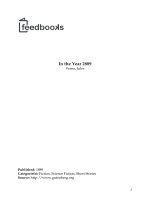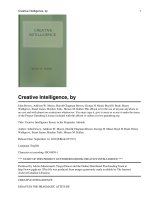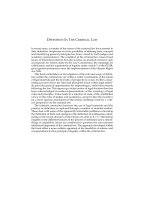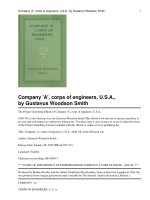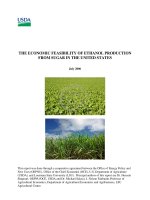Interactive Writing in the EFL Class.doc
Bạn đang xem bản rút gọn của tài liệu. Xem và tải ngay bản đầy đủ của tài liệu tại đây (147.74 KB, 13 trang )
Interactive Writing in the EFL Class: A
Repertoire of Tasks
María Palmira Massi
Universidad Nacional del Comahue (Río Negro, Argentina)
Writing in the EFL Situation: Theoretical Perspectives
Writing plays an important role in our personal and professional lives, thus, it has become
one of the essential components in university English for General Purposes (EGP) and
English for Academic Purposes (EAP) curricula. Its multifarious pedagogical purposes
range from reinforcement, training and imitation (generally in the early stages of
instruction) to communication, fluency and learning (at intermediate and more advanced
levels) (A. Raimes 1983, 1987). In this article, we will concentrate on the last three
purposes, namely, communication, fluency and learning, since we consider writing as a
tool for the creation of ideas and the consolidation of the linguistic system by using it for
communicative objectives in an interactive way. From this perspective, writing implies the
successful transmission of ideas from an addresser to an addressee via a text, and this
exchange of information becomes a powerful means to motivate and encourage the
development of language skills (C. Boughey 1997).
We favour a process approach to teaching the writing skill from the outset (T. Hedge 1988,
R. White and V. Arndt 1991, A. Raimes 1993) since its social orientation becomes visible
and highlights the writer-text-reader interaction, thus purpose and audience are all
important in the production of discourse while the functional dimension of communication
is reinforced. As students need to be familiarised with specific discursive conventions and
constraints when addressing a new or unfamiliar readership, we also adhere to a genre
approach to the teaching of writing (J. Swales 1990). The social purposes of a
communicative event exert a powerful influence on the textual choices a writer makes and,
for this reason, the students should be made aware of the sets of schemata which determine
both the content and the form of the texts they will be asked to produce. So preparation for
the tasks will comprise exposure to authentic material plus a thorough discourse analysis of
the different genres before they set out to develop their own texts . Recent analyses of the
strengths and weaknesses of the process and the genre approaches reveal the convenience
of adopting a complementary position which combines the tenets of both theoretical
orientations (R. Bamforth 1993, R. Badger and G. White 2000).
In the traditional paradigm, a preoccupation with 'the composition' and 'the essay' at the
expense of other types of writing, plus a strong concern for usage over use seemed to be the
golden rule. Our contention is that positive results accrue from the implementation of a
discourse-oriented writing approach once our students have acquired an effective command
of the foreign language in a range of familiar situations and have a good operational
performance--intermediate level or beyond. In this context, assigning tasks which pose
'real' problems to solve is a challenging option to keep their motivation high and create a
sense of achievement (C. Tribble 1996). By generating and encouraging interactive writing,
not just texts per se to be read and graded by the teacher, our students will gain self-
confidence, fluency and autonomy, and they will be stimulated to express their own
authentic voices in the process of text production.
Making Writing Interactive
Writing is an interactive process by nature since it evolves out of the symbolic interplay
between writer, text and reader. By making conditions more 'authentic' than the ones in
traditional classroom tasks, an awareness of audience, purpose and intentionality is
reinforced. While planning a written piece, the writer is constrained to consider the
audience and to adopt a reader-oriented approach so as to achieve a persuasive, emotive or
objective function. Interactivity can be promoted in the writing class by implementing
some of the suggestions that follow (adapted from L. Hamp-Lyons and B. Heasley 1992):
Group-brainstorming on a given topic
(i.e. Students work cooperatively and write down all the ideas that come to mind in
connection with a topic).
Whole class discussion of how a particular text might need adjustment according to the
audience it is addressed to.
Collaborative writing
(i.e. Students work together to write a previously agreed text).
Whole class text construction and composing on the blackboard.
Writing workshop or in-class writing
Students consult each other and co-construct texts while the teacher moves around
listening to their comments, providing feedback or answering questions on
grammatical patterning, lexical items, the force or validity of an argument, the
order of presentation of the information, organizational aspects, use of detail and so
on. The teacher keeps track of their progress and works out a record of most
frequent questions, doubts and inaccuracies for a future 'error analysis session'.
Group research on a text topic
Students divide out the responsibility for different aspects of the information-
gathering stage on a certain topic. They then pool their results and work together to
plan a text, which may be collective or individual.
Peer-editing
Students exchange their first drafts of a text and point out changes which are
needed to help the reader (e.g. better organization, paragraph divisions, sentence
variety, vocabulary choice). They can also act as each other's editors spotting
vocabulary repetitions, grammatical infelicities, spelling mistakes and so on.
Whole class examination of texts produced by other students (with names removed,
photocopied or displayed on an overhead projector) for the purpose of analysis of specific
aspects
(e.g. development of ideas, text structure, cohesion or grammar or adequacy to
context).
Specification of an audience and purpose of a text by making the situation 'real'
(e.g. exchanging e-mail messages with other English-speaking students, sharing
information about a topic another class is actually studying, producing a class
newspaper to be read by family or friends, outlining the explanations of a game
which will then really be played, among many other possibilities).
Interactive writing becomes thus value-laden, communicative and purposeful; at the same
time, it enables the students to permanently challenge their current language practices and
gain the most from the experience. Making writing interactive requires imagination on the
part of the teacher, but is rewarded by the creativity and enthusiasm that most students
display in response.
A Task-based Discourse Approach to Writing
Our discourse approach to writing follows a task-based framework which aims to
encourage classroom interaction so as to maximise opportunities for students to put their
language to genuine use and to create a more effective learning environment (J. Willis
1996:19). The focus of the tasks can vary, ranging from an emphasis on discursive skills
(selection of topic, disposition of the information, complexity of utterances, lexical choice
or tone of the text, according to the students' developmental stages) to a more functional
focus (informing, persuading, requesting, entertaining, convincing and so on) . The
combination of skills is fostered, depending on the task and its complexity, so that along
the drafting-writing-revision procedure, listening, speaking, reading and writing will
overlap and intertwine, involving thinking, talking, consulting sources, doing research,
peer-editing, interacting in groups and the like. On some occasions, cultural aspects are at
play and students may need some help to get familiarised with specific conventions and
constraints in the target culture: the key elements are a clearly defined content and the
adequate rhetorical schemata . In all cases, the situation has to be made clear to the
students, so that they can determine roles, conditions, effects on the interlocutor and
standards to be achieved. The tasks we suggest and outline below refer to activities in the
real world that the learners typically do in their everyday L1 lives and reflect some
canonical 'homely' genres in particular discourse formats -- formal and informal letters,
opinion pieces and stories -- which serve a truly communicative goal.
The Tasks: Writing for Different Audiences, Purposes
and Roles
What follows is a handful of ideas we have explored, experimented with and experienced
in the EFL classroom. These tasks call for the activation of strategies for invention and
discovery. They are rhetorically based, since they entail an in-depth consideration of many
discourse criteria, such as audience, purpose and format. Besides this, they also involve the
intuitive as well as the rational intellectual faculties in a recursive rather than a linear way:
students are forced to examine different aspects of their linguistic knowledge and exploit it
to convey the meanings they wish to express. It is hoped that some of the learning and
communicative activities in this potpourri will work for your writing classes as well as they
have in ours.
1. A Letter to the English Teacher
This writing activity is suitable for all levels of proficiency since the students' pieces will
provide data as to their needs and interests at the beginning of the course, as well as to the
evaluation of their own learning process on its completion. The teacher will certainly get
some interesting feedback from this student-centred quiz that will offer the possibility of
introducing changes, adjusting and improving content selection and methodological
procedures. Besides, it can work as a great motivational force for students who are lagging
behind and need to catch up since they will have to think critically about the relationships
between the course and themselves.
Instructions
[Beginning of the term. First class]
Write a letter to your language teacher. In it, introduce yourself and provide some
information about your likes and interests. State your objectives and expectations from this
course.
[Mid-term evaluation]
Write a letter to your language teacher. In it, evaluate your linguistic experience so far this
year. State the most interesting or valuable aspect of the course. Also provide some topics
that you would like to cover this year, which skills you would like to reinforce, which
activity was the most interesting and which was the least attractive.
[End-of-term evaluation]
Write a letter to your language teacher. In it, provide your personal comments about the
course and the development of your EFL skills. If you were the teacher, what would you do
differently?
2. Sending a Letter Abroad
This task is suitable for young students at intermediate levels, who are generally fascinated
at the 'miracle' of receiving news from English-speaking people through pen-pal groups or
letters sent to an organization. When they realise that they can actually 'do' things with
words, their confidence and motivation increase enormously and they feel the satisfaction
of achieving an apparently impossible goal. For example, before or after working
intensively on a unit on ecology and the environment, the writing task below may add some
interest and stimulate a lot of further discussion and project work.
Instructions
Are you interested in protecting the environment? If so, here is a challenge. Go through the
following 'ecological' addresses. Choose one and write a letter asking for information about
the organization, aims and objectives. Explain that you are a students and tell which school
you go to. Then request brochures, booklets or posters containing the on-going research
and campaings they have recently launched to do something about the environment.
GREENPEACE
1436 U Street N.W.
Washington, D.C. 20009
U.S.A.
Fax: (202) 462-4507
ANIMAL PROTECTION INSTITUTE OF AMERICA
2831 Fruitridge Road
P.O. Box 22505
Sacramento, Calif. 95822
U.S.A.
Fax: (916) 731-4467
NATIONAL COALITION AGAINST THE MISUSE OF PESTICIDES
701 Street S.E.
Suite 200
Washington, D.C. 20003-2841
U.S.A.
The assignment has two stages:
1. Prepare the letter and submit it to your language teacher, who will check for
grammar and vocabulary inaccuracies.
2. Send the letter by e-mail, fax or snail-mail. If you get any material, let us know so
that it can be discussed in class.
If you get an answer, you'll get extra credits for your assignment. So rack your brains to
make the letter as interesting as possible. Good luck!
This task can easily be adapted to different situations. For those students who are about to
stretch out in other directions after the course or wish to embark on programs to improve
their overall performance in an English-speaking country, here is an alternative.
Would you like to get up-dated information about intensive English programs in the USA
or in the UK? Here are some addresses. Write a letter asking for information on the courses
offered, their description, duration, costs, accommodation facilities, application procedures
and any other detail that you consider relevant.
INTERNATIONAL HOUSE
106 Piccadilly
London W 1V 9FL
England
YALE UNIVERSITY
Yale Summer and Special Programs
246 Church St., Suite 1015
New Haven, CT 06510-1722
USA


